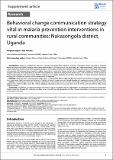Behavioral Change Communication Strategy Vital in Malaria Prevention Interventions in Rural Communities: Nakasongola District, Uganda
Publication Date
12/25/2012Type
Article, Journalviews
downloads
Metadata
Show full item recordCitation
Margaret Mugisa, Abel Muzoora. Behavioral change communication strategy vital in malaria prevention interventions in rural communities: Nakasongola district, Uganda. Pan Afr Med J. 2012;13(Supp 1):2
Abstract/
Introduction: Malaria is a leading killer disease in Uganda and it accounts for significant morbidity in pregnant women and children. Pregnant women are more susceptible to malaria, which causes adverse effects including abortion, low birth weight and maternal anaemia. Children with severe malaria frequently develop one of these symptoms including: severe anaemia, respiratory distress, Prostration, convulsions and cerebral malaria. Due to the severity of the disease there is need for multiple interventions to reduce the disease burden. African Medical and Research Foundation (AMREF) adopted community based approaches to improve malaria prevention. Behavioral change communication (BCC) was fundamental at every process of Project implementation. This paper shares AMREF’s experience in using BCC strategies amidst other interventions in malaria prevention approaches involving use of insecticide treated nets and environment management. Methods: AMREF through a Malaria project (2007-2010) in Nakasongola district supported BCC activities through training, community mobilization, mass media, health promotion and advocacy. Program performance was measured through baseline and evaluation surveys in 2007 and 2010. Results: The final project evaluation indicated improvement from baseline values as follows: knowledge on prevention of malaria among school children from 76.6% to 90%, under five children sleeping under bed net the previous night from 51% to 74.7%, and from 24% to 78% among pregnant women. Conclusion: Mobilization of malaria prevention interventions can be successful once BCC approaches are adequately planned and coordinated. Malaria prevention through BCC strategies are likely to be more effective with integration of other malaria interventions, and involvement of community based structures.
Subject/
Behavioral Change; Communication; Malaria; Uganda; Knowledge; Prevention; Intervention
Further Details
This article is published as part of the supplement “AMREF´s evidence in advancing the health of women and children” Supplement sponsored by AMREF - African Medical and Research Foundation
Publisher
Pan African Medical JournalISSN
1937-8688Collections
- General - GEN [367]

